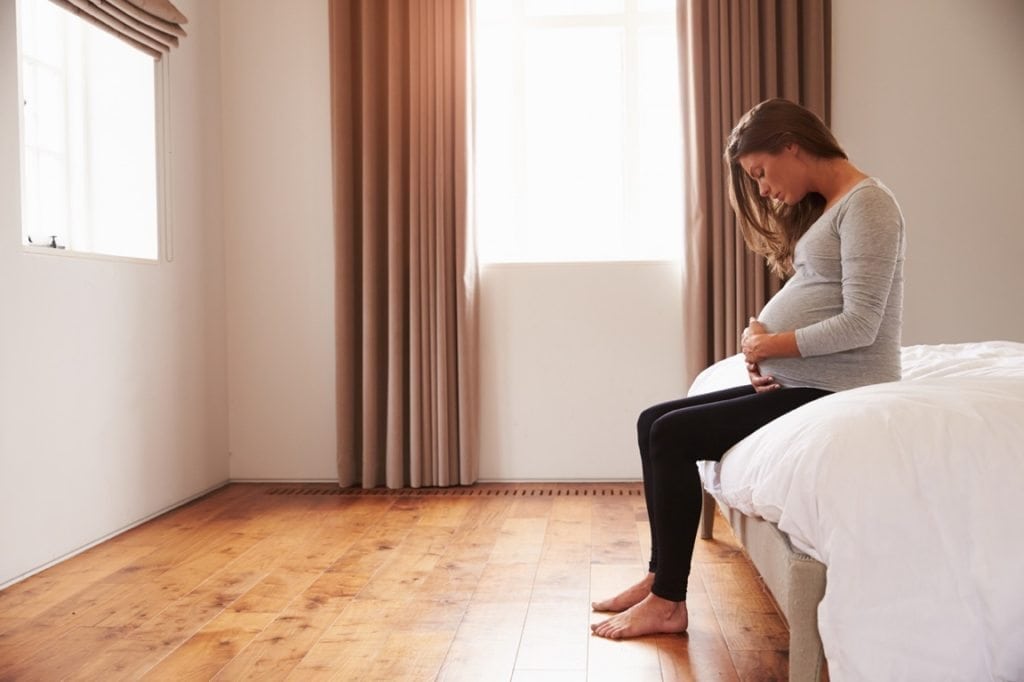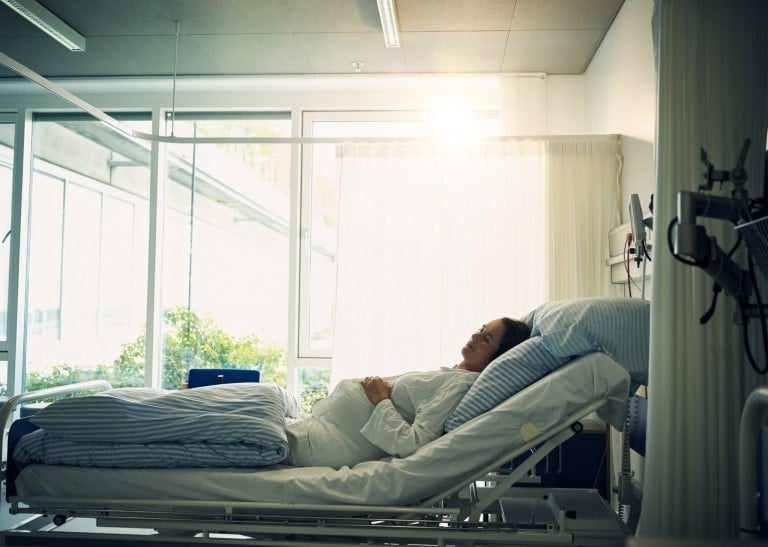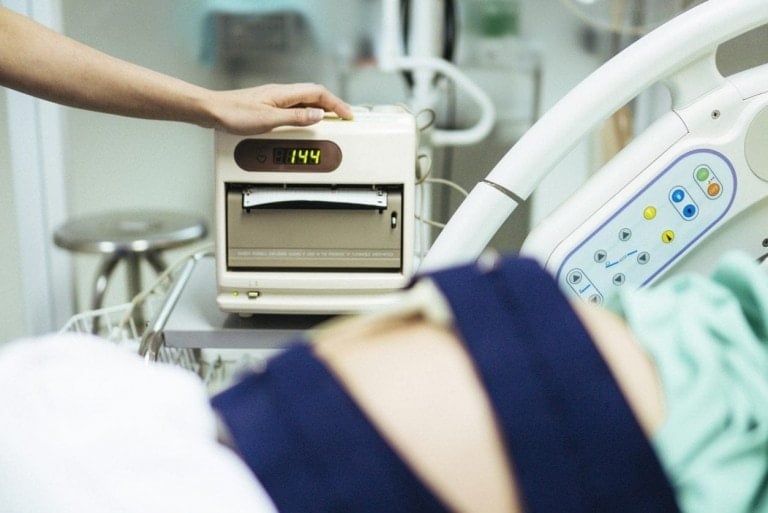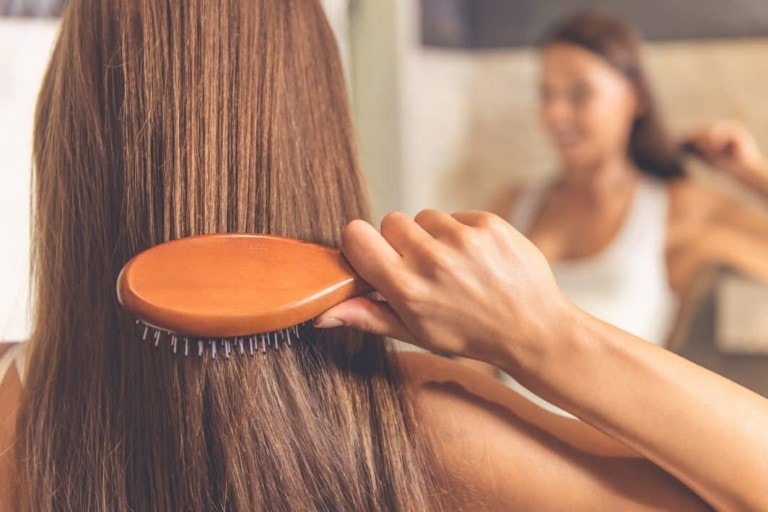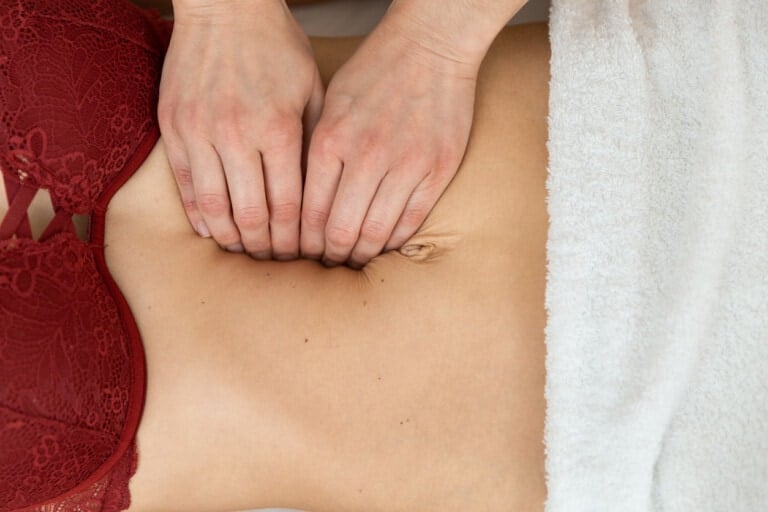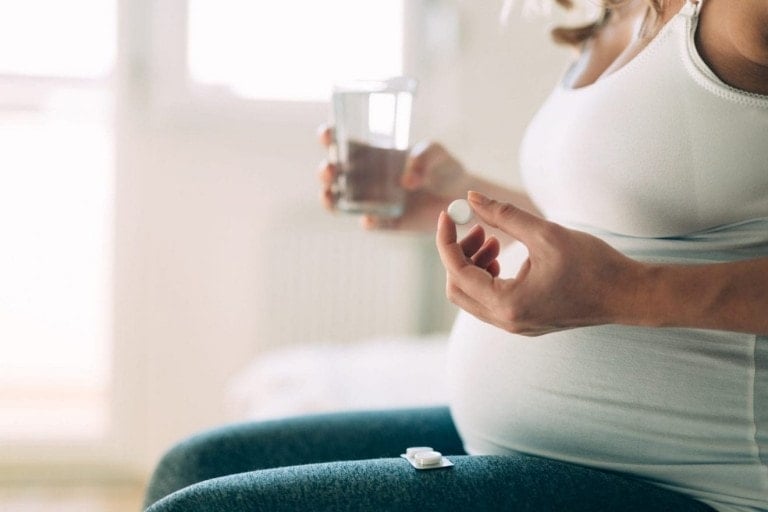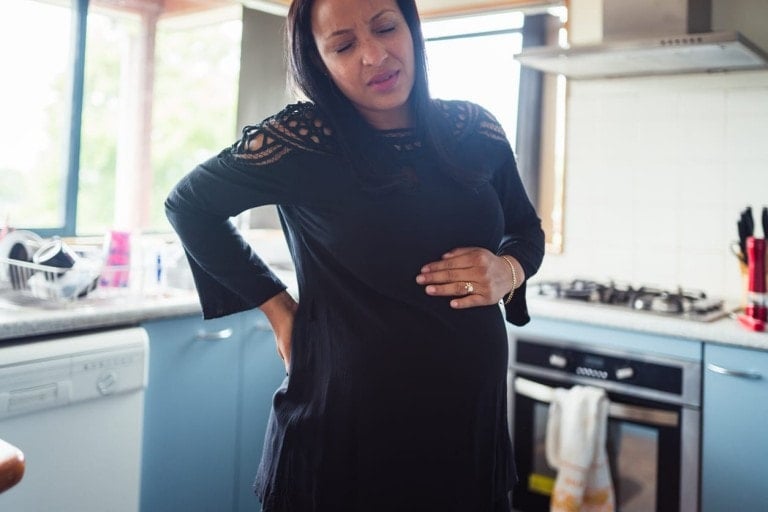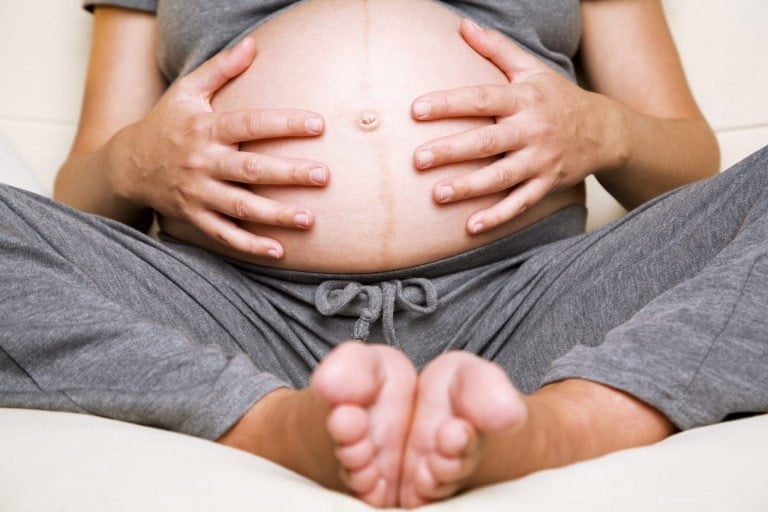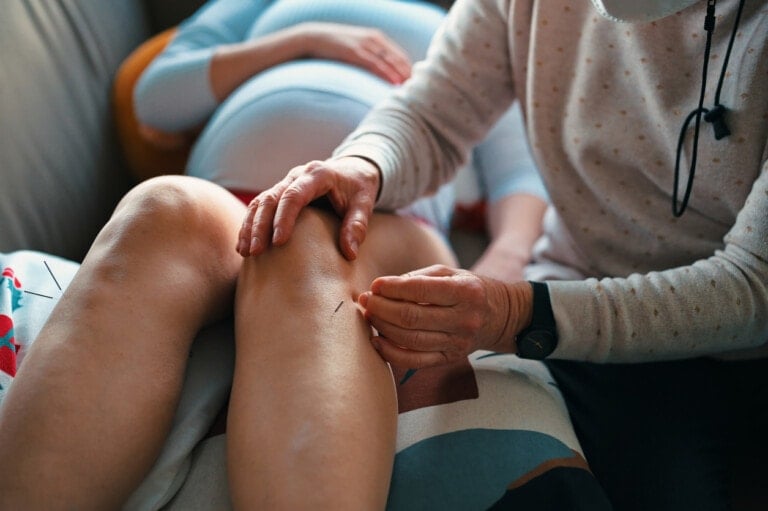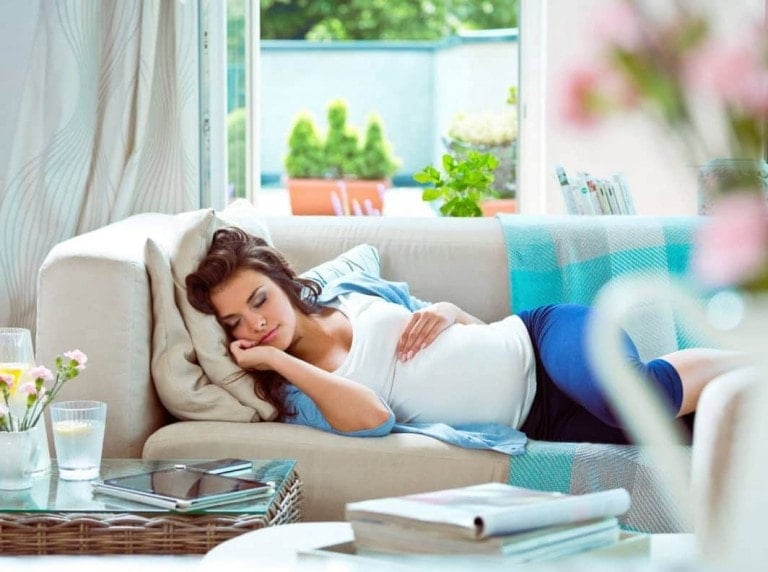When you’re pregnant, each day and to-do list can feel incredibly long . . . especially if you’re experiencing any new pregnancy discomforts. While pregnancy is one of the most exciting times in a woman’s life, it can also be overwhelming and uncomfortable. Your body is doing so much work to grow your sweet baby. With your body rapidly changing during pregnancy to nurture yourself and your child, pregnancy can cause many women to experience discomfort. I know them all too well because I experienced many of them when I was pregnant too!
Many of my expecting clients have asked me about ways to cope with pregnancy discomforts, so I thought I would share my tips with all of you! Here’s to hoping these tips give you the relief you’re looking for and make this special time more enjoyable.
Tips for Coping With Pregnancy Discomforts
Backache
Backaches are common during pregnancy because of the increased weight you’re carrying. Neck and shoulder aches are also normal and can be due to tension and/or the increased weight of your growing breasts. Many women experience lower back pain that can extend or shoot down one side of their back, butt, and into one leg. This is known as sciatica, caused when the baby’s head compresses the sciatic nerve.1 Here are some tips that will help to relieve the discomfort of backaches or avoid them altogether:
- Drive comfortably – Move your car seat forward to keep your knees bent and higher than your hips. Use a small pillow to support your lower back area.
- Lift correctly – It’s important to remember to bend at the knees, not the waist, and lift with your arms and legs, which will take the stress off your back.
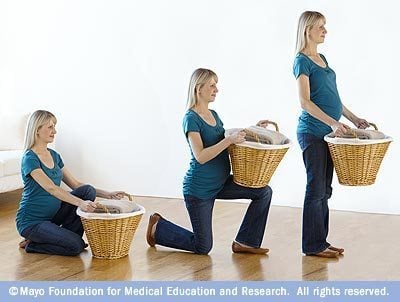
- Limit your standing – Avoid standing in one place or position for too long. If your job requires long periods of standing, keep one foot on a raised surface, such as a step or a box, to prevent your lower back from curving inward. If you are experiencing back pain when standing at a table, lean forward with your knees slightly bent, and support your weight with your hands or elbows.
- Use ice or a cold pack – Place a bag with ice, wrapped in a towel, against the small of your back when sitting down.
- Elevate your feet – When seated, prop up your feet with a footstool, stack of files/books, pillows, trash can, or anything else available.
- Stretch daily – This is a must-do during pregnancy. At work, try setting the clock on your phone or computer to beep at you every thirty minutes to remind you to get up and stretch. Read the best stretches for pregnancy back pain.
- Avoid wearing high heels – I love heels just as much as the next girly girl, but if you’re experiencing chronic back pain, trade those heels for some lower ones. It will really help your back. It’s time to wear sturdy shoes with a heel no higher than one inch. Save those higher heels for special meetings and date nights, and place thin foam rubber inserts in the toes to reduce pressure.
- Wear a maternity belt – A wide, soft, supportive elastic band that wraps around your lower back and under your belly can take over part of the job of tired, stretched abdominal and back muscles as it cradles the weight of your growing belly.
- Improve your posture – Try to keep your shoulders and hips in line as you walk, and keep your back straight by tucking a pillow behind you when you’re seated.
Edema (Swelling)
Two-thirds of pregnant women experience some excess fluid accumulation in their feet, legs, face, and hands. This condition is related to hormone buildup in your system, which results in the kidneys collecting more water and salt than usual. If your job keeps you walking a lot and on your feet, you are also more likely to experience edema.
You should immediately alert your doctor if you experience sudden, extreme swelling. This could be a warning sign of Preeclampsia (Toxemia). It is much more common to experience edema in your legs and feet during your third trimester, but if you have swelling in your face and/or hands or experience these symptoms earlier in your pregnancy, contact your care provider. Mild swelling, which is considered normal and beneficial, can be relieved by these methods:
- Raise your legs – Prop up your legs on anything available: a footstool, a stack of papers, books, or a box. Also, elevate your feet and hands above your heart to reduce swelling by gravity. If possible, lie down during the day on your left (heart) side, not on your back. This position prevents your uterus from compressing major arteries and lets your system reabsorb the fluid. Also, try walking around the block during your lunch hour.
- Soak your feet – Tired, burning feet should be soaked at the end of a workday. And if you can treat yourself to a pedicure every now and then, even better! Also, throughout the day, rotate your ankles to help with circulation and reduce swelling of the feet.
- Keep water with you – Consuming extra water will help draw fluid from puffy tissues back into your bloodstream to be excreted by your kidneys later. Have a glass or bottle of water nearby throughout the day.
- Wear loose clothing – Although you always want to look well dressed at work and everyday life, choose looser clothes for maternity wear.
- Watch your diet – You may want to indulge in sweets and treats but avoid fatty foods. You want to eat plenty of protein and reduce salt, which causes fluid retention.
Fatigue
As I’ve said before, growing a baby takes a lot of work. You are, more than likely, feeling extreme fatigue. This is normal. By the second trimester, your body will probably have adjusted, and you may feel a burst of energy. By the third trimester, however, you may feel exhausted again and need more rest. There’s no cure for this. Your body is going through a lot. These are things you can do to help fight your daytime fatigue:
- Go to bed early – Never mind the undone chores you see at home. This is the time to catch up on rest since you and your baby are growing daily. You need the rest!
- Try to reduce worrying – Making an effort not to worry about work and home concerns can relieve the tension that builds up during the day. Go for a walk, exercise, and get some fresh air.
- Delegate responsibilities – If you’re in a position at work to delegate responsibilities when the pressure becomes too great, do so. Most coworkers will understand and will want to help, so don’t feel guilty about doing it. At home, ask your partner, family, and friends for help. They, too, want you and your baby to do well and be stress-free.
- Learn your daily rhythms of alertness and fatigue – Do strenuous or creative work during alert times; rest during tired periods. If you can, take a quick nap during your lunch hour. If possible, ask your employer to reduce your hours temporarily if you can’t keep up near the end of your term. It never hurts to ask.
- Combat anemia – Many women have anemia, resulting in tiredness, weakness, and fainting. You will need to add more iron-rich foods to your diet, such as lentils and green leafy vegetables. Doctor-recommended iron tablets can help as well. Learn more about the importance of iron in pregnancy.
Headaches
Headaches are common during pregnancy. They may be caused by hormonal changes, which you have little control over. But you may alleviate the problem by doing these:
- Rest – Sit in a dark, quiet room with your eyes closed. Try meditation, prenatal yoga, or other relaxation techniques until it passes.
- Hydrate – Headaches are commonly caused by dehydration. This is yet another reason why having water throughout the day is important.
- Breathe fresh air – Avoid stuffy, overcrowded, smoke-filled rooms. Step outside, if possible, for a breath of fresh air.
- Eat regularly – Little or no food over a long period can cause your blood sugar level to drop. Eat small meals/snacks throughout the day. Excessive caffeine can also cause headaches, as well. Limit your intake if your headaches continue to persist.
- Try to reduce stress – Avoid unnecessary stressful situations when possible and find ways to control the stress you cannot avoid. This is easier said than done but talk to the people around you to help limit your stress.
- Take calcium – Calcium tends to quiet your nerves and ease a headache. If the headaches are regular, take up to four 450-milligram calcium tablets daily. (Consult your care provider first.) If you suddenly develop a severe headache, call your doctor. It could indicate the onset of toxemia.
- Reduce salt intake– too much salt can cause headaches and high blood pressure, especially during pregnancy.
- Use cold compresses – Place a cold, moist cloth on your forehead or the back of your neck. Add a few drops of essential oil lavender to your washcloth to help with relaxation.
- Use liniments – Rub peppermint oil or Tiger Balm on your temples, or drink peppermint tea.
- Take non-aspirin pain relievers – If other methods are not working, Tylenol might help. With any antibiotics, get your doctor’s approval first.
Heartburn & Indigestion
Thankfully, the heart has nothing to do with this problem. Heartburn involves regurgitation of stomach acid back into the throat or esophagus. It’s a mild form of indigestion that, once again, is caused by hormonal changes. Many expecting women experience this pregnancy discomfort, and it is definitely no fun. You may experience a burning sensation in your upper abdomen or lower chest, a bitter taste in your mouth, and some burping. If you are, here are ways to relieve this problem:
- Eliminate certain foods – Stop drinking citrus fruit juices or beverages made from them. Eliminate rich, greasy, and spicy foods from your diet. (I know, no fun.) Instead, have snacks, such as yogurt and honey, papaya, apples, or toast. Also, stay away from caffeine-filled drinks.
- Eat small amounts regularly rather than a few big meals – Avoid overeating too quickly. Check out these pregnancy snacks to keep in your purse.
- Drink water – A glass of water will wash away the acid. Then coat your stomach with some milk, buttermilk, or cream. Or try some peppermint tea.
- Chew gum – Chew a stick of gum after meals or sip a carbonated drink.
- Try a tablespoon of honey in a glass of warm milk.
- Use antacids – Ask your physician about using Maalox or an antacid to relieve the discomfort. You can keep these products in your purse or desk drawer and use them whenever necessary. Note: Liquid antacids are more effective than tablets.
- Change your position – Try sitting or standing. Avoid lying down; it may only worsen the condition. Sleep propped up with extra pillows – an elevated head may help.
- Remain upright after eating.
- Try some herbal and homeopathic remedies.
Hemorrhoids
Constipation and straining to move your bowels may cause hemorrhoids (varicose veins of the rectum caused by pressure). While hemorrhoids are a common pregnancy discomfort for many women, they do shrink after delivery. If they cause you pain, try the following aids:
- If you sit for long hours, use a pillow or a doughnut-shaped rubber cushion to relieve the discomfort. Apply ice packs or pads soaked in witch hazel with a few drops of lavender. Drugstores sell Tucks, which works well too.
- If you stand for long hours at work, take sitting breaks whenever your supervisor gives you the okay.
Muscle Cramps
Muscle cramps in the back, groin, and legs (common in the calves) caused by slow blood circulation and pressure on certain nerves are common occurrences. If you cramp up, give these ideas a try:
- Change your position by sitting in another position for a few minutes.
- If you’re standing when the cramp occurs, keep your weight evenly distributed and flex your knees. Avoid pointing your toes. Instead, bring your toes upward, pushing out your heel.
- Place a hot-water bag or heating pad directly on the cramped muscle.
- Drink lots of fluids. Place two tablespoons of honey in a glass of warm water to help your muscles relax.
- Wear support hose to help relieve leg cramps during pregnancy. A well-fitting maternity girdle and low-heeled shoes will also alleviate the strain on your muscles.
Nausea, Vomiting, & Morning Sickness
Many women suffer from this pregnancy discomfort. Occasional nausea is common because of the pressure on organs and the high estrogen levels in the body, especially in early pregnancy. If you are prone to vomiting, keep towels, a trashcan, mouthwash, or breath mints nearby, and figure out the quickest way to the bathroom. If you are driving, have a big bottle of ice water handy and drive with the window down or cool air on your face. Also, keep plastic grocery bags ready in case you can’t make it out of the car.
Nosebleeds
The tiny blood vessels of the nose become more congested during pregnancy and break open easily. That’s why nosebleeds are so common. Dry air tends to worsen the problem. You might try these techniques:
- Apply pressure – Lean your head forward and apply pressure to the bridge of your nose with your fingers for at least four minutes. Keep tissues handy to protect your clothing.
- Try Vaseline – Apply Vaseline with a cotton-tip swab to each nostril to stop the bleeding.
- Use a spray – If your nose feels uncomfortably full after a nosebleed, mix ½ teaspoon of salt with ½ cup of warm water, and spray each nostril with the mixture. You could also use a Saline spray.
Overheating
Did you know that your basal metabolic rate (the rate at which you expend energy) increases by 20% during pregnancy?2 It does! This causes your glands to work overtime and increases the blood flow to your skin. This is why you’re likelier to feel uncomfortable in warm and cold weather. It takes a little extra effort to keep yourself cool during pregnancy, so try to do the following:
- Bathe daily – A daily bath is a must during pregnancy and helps you relax.
- Use a good antiperspirant – This is an obvious one.
- Dress in layers – As the office gets warmer, you can remove a layer at a time until you’re down to a light blouse.
- Keep tissues nearby – Sometimes, sweaty palms make it difficult to work. A box of tissues, a handkerchief, or even a towel are handy to keep conveniently nearby.
- Wear foot pads – If your feet become less tolerant to heat, use foot pads to keep perspiration under control.
- Keep a fan with you – Have one in your office, at your workstation, or even a portable one in your purse.
- Schedule your time – Try to avoid being outside between 11 am and 3 pm when the sun is at its strongest.
- Try not to accept work assignments that could take too much of a physical toll – An all-day business conference is draining enough under any circumstances. But for mothers-to-be, such an event can be downright exhausting.
Frequent Urination
As your pregnancy progresses, you may notice that your bladder is filling up more quickly, and you have to go to the bathroom more frequently. This is a common pregnancy discomfort. Your uterus is placing more and more pressure on your bladder as your baby grows, so that is part of the problem. But not only that, you’re drinking more water to relieve constipation and dehydration and possibly to treat a urinary tract infection. To be on the safe side, do the following:
- Empty your bladder frequently throughout the day – You may have to explain to your boss that you will need more frequent bathroom breaks.
- Wear a sanitary pad – Sometimes, nature calls before you can run out the door. Be prepared in case you can’t reach the restroom in time. Carry an extra one in your purse as well, just in case.
- Tell your doctor – Frequent urination may also result from an infection.3 If the problem increases, talk to your care provider.
Varicose Veins
When veins become weakened and enlarged because they’ve had to work harder to circulate the blood, those are called varicose veins. Heredity also plays a part in their development. Pregnant women will often develop them in their legs and, less often, in their genital area. The good thing is you can expect them to fade a good amount after birth. While you are pregnant, however, there are efforts you can make to reduce the threat, such as:
- Move around often – Walking and exercising provides the best protection against varicose veins. Elevate your legs when you’re sitting to hurry the return of blood from your legs.
- Wear support hose – Especially if you stand for long periods, wear elastic support stockings or maternity pantyhose, which you should put on while lying on your back. Also, avoid tight clothing.
- Don’t cross your legs for long periods.
Vision Changes
Increased water retention and elevated hormone levels may cause visual disturbances. If you experience vision changes and swelling in the face and hands, it usually means something more serious, like toxemia. If you are not experiencing facial and hand swelling with blurry vision, this difficulty should only be temporary. Take these precautions while waiting for it to pass:
- Cleanse contact lenses often – Cloudy contact lenses interfere with your work and life. Keep a lens-cleaning kit with you and use it whenever necessary. If contacts don’t fit as well, as usual, wear glasses instead.
- Use eye drops – Ask your doctor to recommend a good brand of eye drops and use them several times during the day.
- Avoid eye strain – You may not be able to cut down on reading if your work responsibilities require it, but be sure to rest your eyes in the evening if they’ve been bothering you. This means avoiding watching TV.
Alright, ladies! There you have it! These are all of the ways to cope with pregnancy discomforts. I hope these tips help.













